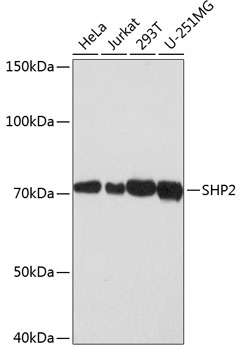Anti-SHP2 Antibody (CAB19112)
- SKU:
- CAB19112
- Product type:
- Antibody
- Reactivity:
- Human
- Host Species:
- Rabbit
- Isotype:
- IgG
- Research Area:
- Cell Biology
Description
| 抗体名: | Anti-SHP2 Antibody |
| 抗体コード: | CAB19112 |
| 抗体サイズ: | 20uL, 50uL, 100uL |
| 申し込み: | WB IP |
| 反応性: | Human |
| 宿主種: | Rabbit |
| 免疫原: | A synthesized peptide derived from human SHP2 |
| 申し込み: | WB IP |
| 推奨希釈: | WB 1:500 - 1:2000 IP 1:50 - 1:200 |
| 反応性: | Human |
| ポジティブサンプル: | HeLa, Jurkat, 293T, U-251MG |
| 免疫原: | A synthesized peptide derived from human SHP2 |
| 精製方法: | Affinity purification |
| ストレージバッファ: | Store at -20°C. Avoid freeze / thaw cycles. Buffer: PBS with 0.02% sodium azide, 0.05% BSA, 50% glycerol, pH7.3. |
| アイソタイプ: | IgG |
| 順序: | Email for sequence |
| 遺伝子ID: | 5781 |
| Uniprot: | Q06124 |
| セルラーロケーション: | Cytoplasm |
| 計算された分子量: | 68kDa |
| 観察された分子量: | 70kDa |
| 同義語: | BPTP3, CFC, JMML, METCDS, NS1, PTP-1D, PTP2C, SH-PTP2, SH-PTP3, SHP2, PTPN11 |
| バックグラウンド: | The protein encoded by this gene is a member of the protein tyrosine phosphatase (PTP) family. PTPs are known to be signaling molecules that regulate a variety of cellular processes including cell growth, differentiation, mitotic cycle, and oncogenic transformation. This PTP contains two tandem Src homology-2 domains, which function as phospho-tyrosine binding domains and mediate the interaction of this PTP with its substrates. This PTP is widely expressed in most tissues and plays a regulatory role in various cell signaling events that are important for a diversity of cell functions, such as mitogenic activation, metabolic control, transcription regulation, and cell migration. Mutations in this gene are a cause of Noonan syndrome as well as acute myeloid leukemia. [provided by RefSeq, Aug 2016] |
| UniProt Protein Function: | SHP-2: a SH2-containing a ubiquitously expressed tyrosine-specific protein phosphatase. It participates in signaling events downstream of receptors for growth factors, cytokines, hormones, antigens and extracellular matrices in the control of cell growth, differentiation, migration, and death. Activation of SHP-2 and its association with Gab1 is critical for sustained Erk activation downstream of several growth factor receptors and cytokines. |
| UniProt Protein Details: | Protein type:Motility/polarity/chemotaxis; Protein phosphatase, tyrosine (non-receptor); EC 3.1.3.48 Chromosomal Location of Human Ortholog: 12q24 Cellular Component: cytoplasm; cytosol; nucleus Molecular Function:1-phosphatidylinositol-3-kinase activity; insulin receptor binding; non-membrane spanning protein tyrosine phosphatase activity; phosphatidylinositol-4,5-bisphosphate 3-kinase activity; phosphoprotein phosphatase activity; protein binding; protein tyrosine phosphatase activity; SH3/SH2 adaptor activity Biological Process: brain development; ephrin receptor signaling pathway; epidermal growth factor receptor signaling pathway; fibroblast growth factor receptor signaling pathway; genitalia development; heart development; inner ear development; leukocyte migration; phosphoinositide-mediated signaling; platelet activation; regulation of cell adhesion mediated by integrin; regulation of phosphoinositide 3-kinase cascade; regulation of protein complex assembly; T cell costimulation Disease: Juvenile Myelomonocytic Leukemia; Leopard Syndrome 1; Metachondromatosis; Noonan Syndrome 1 |
| NCBI Summary: | The protein encoded by this gene is a member of the protein tyrosine phosphatase (PTP) family. PTPs are known to be signaling molecules that regulate a variety of cellular processes including cell growth, differentiation, mitotic cycle, and oncogenic transformation. This PTP contains two tandem Src homology-2 domains, which function as phospho-tyrosine binding domains and mediate the interaction of this PTP with its substrates. This PTP is widely expressed in most tissues and plays a regulatory role in various cell signaling events that are important for a diversity of cell functions, such as mitogenic activation, metabolic control, transcription regulation, and cell migration. Mutations in this gene are a cause of Noonan syndrome as well as acute myeloid leukemia. Two transcript variants encoding different isoforms have been found for this gene. [provided by RefSeq, May 2012] |
| UniProt Code: | Q06124 |
| NCBI GenInfo Identifier: | 84028248 |
| NCBI Gene ID: | 5781 |
| NCBI Accession: | Q06124.2 |
| UniProt Secondary Accession: | Q06124,Q96HD7, A8K1D9, |
| UniProt Related Accession: | Q06124 |
| Molecular Weight: | 52,828 Da |
| NCBI Full Name: | Tyrosine-protein phosphatase non-receptor type 11 |
| NCBI Synonym Full Names: | protein tyrosine phosphatase, non-receptor type 11 |
| NCBI Official Symbol: | PTPN11 |
| NCBI Official Synonym Symbols: | CFC; NS1; JMML; SHP2; BPTP3; PTP2C; METCDS; PTP-1D; SH-PTP2; SH-PTP3 |
| NCBI Protein Information: | tyrosine-protein phosphatase non-receptor type 11 |
| UniProt Protein Name: | Tyrosine-protein phosphatase non-receptor type 11 |
| UniProt Synonym Protein Names: | Protein-tyrosine phosphatase 1D; PTP-1D; Protein-tyrosine phosphatase 2C; PTP-2C; SH-PTP2; SHP-2; Shp2; SH-PTP3 |
| Protein Family: | Tyrosine-protein phosphatase non-receptor |
| UniProt Gene Name: | PTPN11 |
| UniProt Entry Name: | PTN11_HUMAN |


